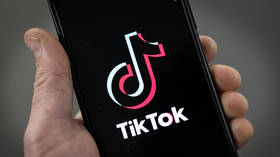Academics take Texas to court over TikTok
The litigants argue that the ban on the Chinese-owned video-hosting service is unconstitutional
University faculty and free speech advocates in Texas have sued the state government over a rule prohibiting the use of TikTok on official networks, claiming the ban has harmed academic research and violates the US Constitution.
Filed on Thursday on behalf of the Coalition for Independent Technology Research, whose members include public university professors, the lawsuit argued that the TikTok ban tramples academic freedoms and constitutional rights, insisting the government has no authority to “control” scholarship.
“Texas’s decision to restrict public university faculty from accessing a major communications platform is compromising both research and teaching,” the plaintiffs said, adding that the ban is also “unconstitutional” and “cannot survive First Amendment scrutiny.”
Dr. Michael Williams, Chancellor of the University of North Texas System, and several members of the university’s board of regents, are among the plaintiffs.
Implemented last December by Texas Governor Greg Abbott, the measure prohibited state officials from using TikTok on government networks or devices, and imposed restrictions for state-funded universities. Supporters of the ban say the social media platform poses a grave threat to the data and privacy of Americans, citing its ownership by the Chinese-based company ByteDance.
However, the suit went on to state that in addition to curtailing legitimate research – including on the potential risks of TikTok – the ban has failed to “meaningfully constrain China’s ability to collect sensitive data about Americans.”
“While Texas has a legitimate interest in protecting Texans’ privacy, the ban is not tailored to this interest,” it continued, asking the court to overturn the restrictions or provide a “constitutionally adequate means of accessing TikTok for research and teaching purposes.”
More than 20 states have adopted bans similar to the one in Texas, while the federal government has also barred employees and contractors from accessing TikTok on official devices. Mirroring concerns raised by state officials, both the FBI and the Federal Communications Commissions have warned that the site could pass user data to its parent firm, or even the Chinese government.
However, Beijing and TikTok itself have repeatedly rejected the privacy fears, insisting they are unfounded and that the platform’s data is secure. Earlier this year, a Chinese Foreign Ministry spokesman urged the United States to stop “suppressing” the company, accusing officials of “spreading disinformation” about TikTok.
A number of US rights groups have also challenged TikTok bans around the country. After Montana took up its own prohibition in May, the American Civil Liberties Union said the measure was inspired by “anti-Chinese sentiment,” while trade group NetChoice stated it “ignores the US Constitution, due process and free speech.”
You can share this story on social media:








Comments are closed.